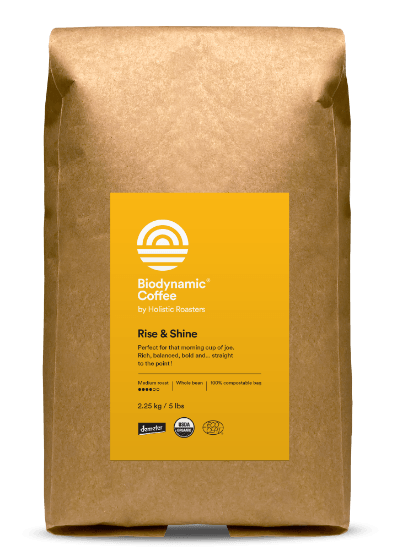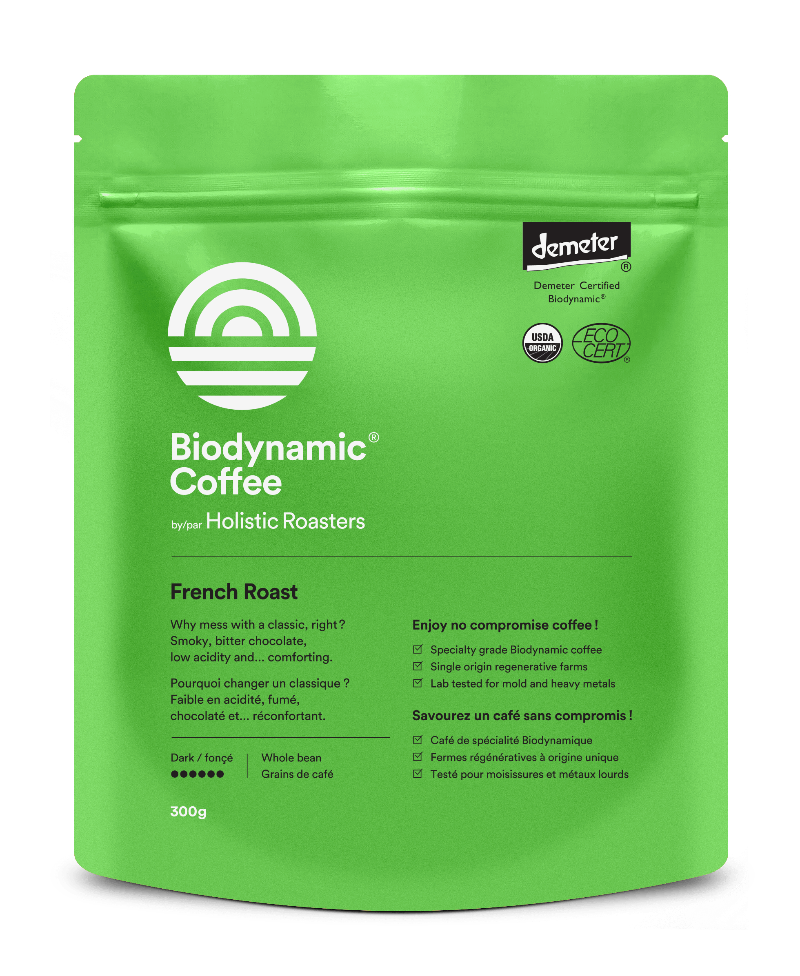Coffee's Role in Supporting Gut Microbiome Health
Listen while you browse:
Google's Deep Dive Podcast on Coffee's Role in Supporting Gut Microbiome Health
What You'll Learn About Biodynamic Coffee and Gut Health
- Introduction to Coffee and Gut Health
- Understanding Your Gut Microbiome
- The Science: How Coffee Affects Gut Bacteria
- Why Biodynamic Coffee Makes a Difference
- Biodynamic vs. Organic vs. Conventional Coffee
- Key Compounds in Coffee That Support Gut Health
- Practical Tips for Gut-Friendly Coffee
- Frequently Asked Questions
How Biodynamic and Organic Coffees Support Gut Microbiome Health
Gut health isn't just a passing trend—it's a foundation for your overall wellbeing. From improved digestion to a stronger immune system, a healthy gut microbiome touches nearly every aspect of how we feel day to day. As people become more conscious about what they put in their bodies, clean, organic foods are gaining attention. But did you know your morning cup of coffee can play a role in supporting your gut health—especially when it's grown Biodynamically?

The Quick Scoop
Emerging research shows coffee can positively influence your gut microbiome by increasing beneficial bacteria and promoting microbial diversity. Biodynamic coffee takes these benefits further by minimizing exposure to pesticides that can harm gut bacteria, while providing a richer profile of gut-supporting polyphenols. This article explores the science behind how clean, Biodynamic coffee may become your gut's new best friend.
Understanding Your Gut Microbiome: A Complex Ecosystem
Before we dive into coffee's benefits, let's understand what we're nourishing. Your gut microbiome refers to the trillions of microorganisms—mostly bacteria—that inhabit your digestive tract. These microbes aren't just passive residents; they're active participants in your health.
Food Digestion
Gut bacteria break down complex carbohydrates that human enzymes can't digest, extracting additional nutrients and energy.
Vitamin Synthesis
Your microbiome produces essential vitamins, including vitamin K and several B vitamins that your body cannot make on its own.
Immune Training
Nearly 70% of your immune system resides in your gut, where microbes help train immune cells to distinguish friend from foe.
Brain Connection
Through the gut-brain axis, your microbiome influences mood, stress responses, and even cognitive function.
Disruptions in the balance of these microbes (known as dysbiosis) have been linked to a range of issues, from digestive discomfort to metabolic disorders and even depression. Research from the Human Microbiome Project has shown just how crucial microbial diversity is for maintaining a resilient, healthy gut.
Did You Know?
Your gut contains roughly 100 trillion bacterial cells—about 10 times more than all the human cells in your entire body! And while you share about 99.9% of your human DNA with other people, you might only share 10-20% of your gut microbiome with the person sitting next to you. This makes your gut bacteria profile almost like a fingerprint.
The Science: How Coffee Affects Gut Bacteria
You may have heard that coffee is good for your digestion, but what does the science say about its impact on gut bacteria? Recent studies have revealed some fascinating connections between coffee consumption and gut microbiome health.
Key Research Findings on Coffee and Gut Health
Bifidobacterium Boost
A human volunteer study published in the International Journal of Food Microbiology found that drinking coffee increased populations of Bifidobacterium species, which are linked to improved digestive and immune health.
Diversity Confirmation
Researchers at the University of Groningen discovered that coffee consumption was positively associated with overall microbial diversity—a key marker of gut health and resilience.
Polyphenols as Prebiotics
A comprehensive review highlighted coffee's unique polyphenols as "prebiotic-like compounds" that can shape the gut microbial community in beneficial ways.
Anti-Inflammatory Effects
New research published in Cell Reports Medicine demonstrated how specific coffee compounds can reduce gut inflammation by modulating bacterial metabolism and strengthening the intestinal barrier.
Promoting Microbial Diversity
Regular coffee drinkers tend to have a more diverse microbiome—a marker of gut health resilience. Studies have shown a positive association between moderate coffee consumption and greater bacterial diversity in the gut.
This diversity is crucial because a varied microbial community provides redundancy in metabolic functions and greater resistance to disruption from illness, stress, or dietary changes.
The complex mixture of bioactive compounds in coffee appears to create an environment where multiple bacterial species can thrive, rather than promoting just a few strains—making coffee a truly unique dietary component for gut support.
Increasing Beneficial Bacteria
Coffee consumption has been linked to increases in Bifidobacterium and Lactobacillus families—bacterial groups widely recognized for their health-promoting properties.
Bifidobacteria produce short-chain fatty acids like butyrate that nourish colon cells and strengthen gut barrier function. Meanwhile, Lactobacilli help maintain proper pH in the intestines and produce antimicrobial compounds that protect against pathogens.
Research has observed increases in protective Bifidobacteria after regular coffee consumption, suggesting coffee's potential as a dietary factor that positively influences gut microbiota composition.
Reducing Intestinal Inflammation
Coffee's anti-inflammatory effects in the gut may explain why long-term coffee drinkers show lower rates of certain digestive disorders. Several coffee components, including chlorogenic acids, trigonelline, and melanoidins, show anti-inflammatory activity in intestinal tissues.
More significantly, these compounds influence the metabolic output of gut bacteria themselves. For example, they promote bacterial production of propionate and butyrate—short-chain fatty acids that reduce inflammation and strengthen the intestinal barrier.
Research suggests that some of these benefits may be enhanced when coffee is consumed regularly, allowing the gut microbiome time to adapt to coffee's compounds.
Why Biodynamic Coffee Makes a Difference for Your Gut
Not all coffee is created equal—especially when it comes to your gut. Biodynamic coffee goes beyond organic, with unique characteristics that may offer enhanced benefits for your microbiome.
Minimal Pesticide Exposure
Biodynamic coffee is grown without synthetic pesticides or fertilizers. This matters because emerging research suggests that even low-dose exposure to certain pesticides may alter gut microbial balance. A 2019 study in Environmental Pollution found that commonly used agricultural chemicals can reduce beneficial bacterial populations while allowing harmful bacteria to flourish.
Enhanced Soil Microbial Diversity
Biodynamic farming emphasizes soil health through special preparations and ecological practices. This creates rich, living soil with its own diverse microbiome. Fascinating new research suggests a connection between soil microbiome diversity and the nutrient density of crops—including the levels of polyphenols and other beneficial compounds in coffee beans.
Lower Mycotoxin Risk
Mycotoxins are harmful compounds produced by certain molds that can grow on coffee beans. These toxins can disrupt gut barrier function and harm beneficial bacteria. Biodynamic farming practices, with their focus on plant resilience and proper harvesting techniques, may reduce mold growth. Additionally, Holistic Roasters tests every Biodynamic coffee harvest for mycotoxins.
Rich Polyphenol Profile
The regenerative farming methods used in Biodynamic agriculture may result in coffee with a richer profile of polyphenols and other bioactive compounds. These act as powerful prebiotics in your gut, selectively feeding beneficial bacteria. Studies suggest that organically grown crops often contain higher levels of antioxidants than conventionally grown counterparts.

Comparing Biodynamic, Organic, and Conventional Coffee
Understanding the differences between coffee growing methods helps explain why Biodynamic coffee may offer superior gut health benefits. Here's how they stack up:
| Feature | Conventional Coffee | Organic Coffee | Biodynamic Coffee |
|---|---|---|---|
| Pesticides | Often used extensively | Prohibited synthetic pesticides | Prohibited synthetic pesticides, emphasis on natural pest control |
| Soil Health | Not prioritized, often depleted | Protected, encouraged | Central focus, enhanced with special preparations |
| Certification | None or basic | USDA/EU Organic | Demeter Biodynamic (most rigorous) |
| Biodiversity | Monoculture common | Some diversity required | High biodiversity mandatory, farm viewed as organism |
| Mycotoxin Testing | Rarely conducted | Sometimes performed | Often included in quality assurance |
| Gut Health Impact | Potential negative from residues | Positive from reduced toxins | Enhanced positive from superior growing practices |
A Closer Look at Biodynamic Standards
Biodynamic certification through Demeter is considered the gold standard in sustainable agriculture. The requirements go far beyond organic:
- Whole Farm Approach: The entire farm must be certified, not just portions.
- Self-Sufficiency: At least 50% of livestock feed must be grown on the farm.
- Biodiversity Requirement: At least 10% of total land must be set aside for biodiversity preservation.
- Soil Amendments: Special Biodynamic preparations made from fermented herbs, minerals, and manure must be used to enliven the soil.
These requirements create an ecosystem that produces coffee with potentially enhanced levels of beneficial compounds and minimal harmful residues.
Key Compounds in Coffee That Support Gut Health
Coffee is a complex beverage containing over 1,000 bioactive compounds. Several of these have direct and indirect effects on your gut microbiome:
Polyphenols
These plant compounds, especially chlorogenic acids, act as prebiotics that selectively feed beneficial bacteria. Coffee is one of the richest dietary sources of polyphenols for many people.
Melanoidins
These brown compounds formed during roasting have both prebiotic and antioxidant properties. They reach the colon largely undigested, where they can be metabolized by gut bacteria.
Soluble Fiber
Coffee contains moderate amounts of soluble fiber that feeds beneficial bacteria and helps regulate bowel movements, with a typical cup providing about 1.5 grams.
Diterpenes
Cafestol and kahweol have antimicrobial properties that may help maintain balanced gut flora by keeping potentially harmful bacteria in check.
Biodynamic Difference: Enhanced Polyphenol Content
Research suggests that organically grown coffee may contain higher total polyphenol content than conventionally grown coffee from the same regions. Biodynamic growing methods, with their enhanced focus on soil health and plant vitality, may further support the development of these beneficial compounds.
These polyphenols act as prebiotics in your digestive system, potentially offering enhanced gut health benefits compared to conventional coffee.
Practical Tips for Choosing and Brewing Gut-Friendly Coffee
Want to get the most gut-friendly benefits from your coffee? Here are practical recommendations based on current research:
Choose Clean Coffee
Look for certified Biodynamic or organic coffee to minimize exposure to gut-disrupting pesticides. The Demeter Biodynamic seal represents the highest standard. When Biodynamic isn't available, certified organic is your next best option.
Check for Mycotoxin Testing
Purchase from roasters that test their beans for mycotoxins. These mold-derived compounds can harm gut health. At Holistic Roasters, all our Biodynamic coffees undergo rigorous testing for mycotoxins and other contaminants.
Consider Medium Roasts
Medium roasts offer a good balance of gut-supporting compounds. They retain significant chlorogenic acids while developing beneficial melanoidins during the roasting process. They're also typically less acidic than light roasts.
Prioritize Freshness
Coffee's beneficial compounds degrade over time. For maximum gut benefits, choose freshly roasted coffee and use within 2-3 weeks of the roast date. Store in an airtight container away from light, heat, and moisture.
Brewing Method Matters
Brewing method affects which compounds end up in your cup. For maximum gut benefits, consider filter methods (pour-over, drip) or French press. These methods extract more beneficial polyphenols than espresso or instant coffee. Paper filters remove diterpenes, which may be beneficial for some but problematic for those with cholesterol concerns.
Mind Your Additions
What you add to your coffee can enhance or diminish its gut benefits. Choose high-quality dairy or plant-based milks without added sugars or artificial ingredients. Consider adding gut-friendly spices like cinnamon or cardamom, which have their own digestive benefits. Avoid artificial sweeteners, which may negatively affect gut bacteria.
Timing Considerations
For optimal digestion, many experts recommend enjoying coffee with or after meals rather than on an empty stomach. This can reduce potential digestive discomfort while still providing the beneficial effects. However, individual tolerance varies—pay attention to how your body responds.
Moderation Is Key
Research suggests that 1-3 cups daily provides optimal benefits without adverse effects for most people. Start with one cup and see how your body responds. Remember that quality matters more than quantity—one cup of clean, Biodynamic coffee likely offers more gut benefits than multiple cups of conventional coffee.
Frequently Asked Questions About Coffee and Gut Health
Coffee positively influences gut bacteria in several ways. Research has demonstrated that:
- Coffee promotes microbial diversity, with regular drinkers showing more varied gut bacteria profiles—a marker of gut health.
- The polyphenols in coffee act as prebiotics, selectively feeding beneficial bacteria like Bifidobacterium and Lactobacillus.
- Coffee's antioxidant content helps reduce gut inflammation, creating a healthier environment for beneficial microbes.
- Certain compounds in coffee may strengthen the intestinal barrier, reducing "leaky gut" concerns.
A notable 2009 study in the International Journal of Food Microbiology found increased populations of Bifidobacterium after regular coffee consumption—beneficial bacteria linked to improved immune and digestive health.
Biodynamic coffee offers several potential advantages for gut health:
- Lower chemical residues: Grown without synthetic pesticides or fertilizers that can disrupt gut bacteria.
- Richer polyphenol profile: Healthier soil can produce coffee with higher levels of beneficial compounds.
- Reduced mycotoxin risk: Careful farming practices help prevent mold growth that can produce gut-disrupting toxins.
- Ecological focus: Biodynamic farms maintain greater biodiversity, which may translate to more diverse beneficial compounds in the coffee.
Research published in the Journal of Agricultural and Food Chemistry shows that organically grown coffee contains up to 30% more polyphenols than conventional coffee, and Biodynamic practices may enhance this effect even further.
Yes, roast level significantly affects coffee's gut health benefits:
- Light roasts retain more chlorogenic acids and other polyphenols but may be more acidic, potentially causing discomfort for those with sensitive stomachs.
- Medium roasts offer a balance, preserving many beneficial compounds while developing melanoidins that have antioxidant and prebiotic properties.
- Dark roasts contain fewer chlorogenic acids but more N-methylpyridinium, which can stimulate stomach acid secretion and potentially aid digestion. They're also typically less acidic.
For most people seeking gut health benefits, medium roasts provide the optimal balance between beneficial compounds and digestibility. However, individual responses vary, so pay attention to how your body responds to different roast levels.
To ensure you're getting truly clean, Biodynamic coffee:
- Look for Demeter Biodynamic certification, which is the gold standard for Biodynamic products.
- Check for USDA Organic certification as a baseline.
- Ask the roaster about their testing protocols—quality producers will test for mycotoxins, pesticide residues, and other contaminants.
- Consider transparency—good producers share information about their farms, processing methods, and quality control.
- Research the company's reputation among health-conscious consumers.
At Holistic Roasters, we provide detailed information about our Biodynamic certification, testing procedures, and farm partnerships to ensure complete transparency about the cleanliness and quality of our coffee.
For optimal gut health benefits:
- Research suggests 1-3 cups daily provides benefits without adverse effects for most people.
- Start with one cup in the morning and monitor how your body responds.
- Consider having coffee with or after meals rather than on an empty stomach to reduce potential digestive discomfort.
- Remember that individual tolerance varies—those with certain gut conditions like IBS or GERD should consult a healthcare provider.
- Focus on quality over quantity—one cup of clean, Biodynamic coffee likely offers more benefits than multiple cups of lower-quality coffee.
Pay attention to how you feel after drinking coffee. If you notice improved regularity, reduced bloating, or better overall digestion, you're likely experiencing its gut health benefits.
Ready to Support Your Gut with Clean Coffee?
Experience the difference that Biodynamic, lab-tested coffee can make for your gut health and overall wellbeing. Each cup of Holistic Roasters coffee delivers a rich profile of beneficial compounds without the contaminants that can disrupt your microbiome.
Use code GUTHEALTHY for 10% off your first order of Biodynamic coffee.
Shop Biodynamic CoffeeReferences
- Jaquet, M., Rochat, I., Moulin, J., Cavin, C., Bibiloni, R. (2009). "Impact of Coffee Consumption on the Gut Microbiota: A Human Volunteer Study." International Journal of Food Microbiology, 130(2), 117–121.
- Mills, C.E., Tzounis, X., Oruna-Concha, M.J., Mottram, D.S., Gibson, G.R., Spencer, J.P.E. (2020). "Polyphenol-Rich Coffee and Gut Microbiota: Implications for Health." Nutrients, 12(2), 369.
- NIH Human Microbiome Project. (2012). https://commonfund.nih.gov/hmp
- Valdes, A.M., Walter, J., Segal, E., Spector, T.D. (2018). "Role of the gut microbiota in nutrition and health." BMJ, 361.
- Jin, Y., Wu, S., Zeng, Z., & Fu, Z. (2019). "Effects of environmental pollutants on gut microbiota." Environmental Pollution, 251, 963–980.
- Pérez-Burillo, S., Rastrojo, A., Noriega, C.O., Palá-Paúl, J., Pastoriza, S., & Rufián-Henares, J.Á. (2022). "Coffee melanoidins modulate the gut microbiota in vitro." Food Chemistry, 373, 131409.
- Barrea, L., Pugliese, G., Frias-Toral, E., El Ghoch, M., Castellucci, B., Chapela, S.P., ... & Colao, A. (2021). "Coffee consumption, health benefits and side effects: a narrative review and update for dietitians and nutritionists." Critical Reviews in Food Science and Nutrition, 1-24.






